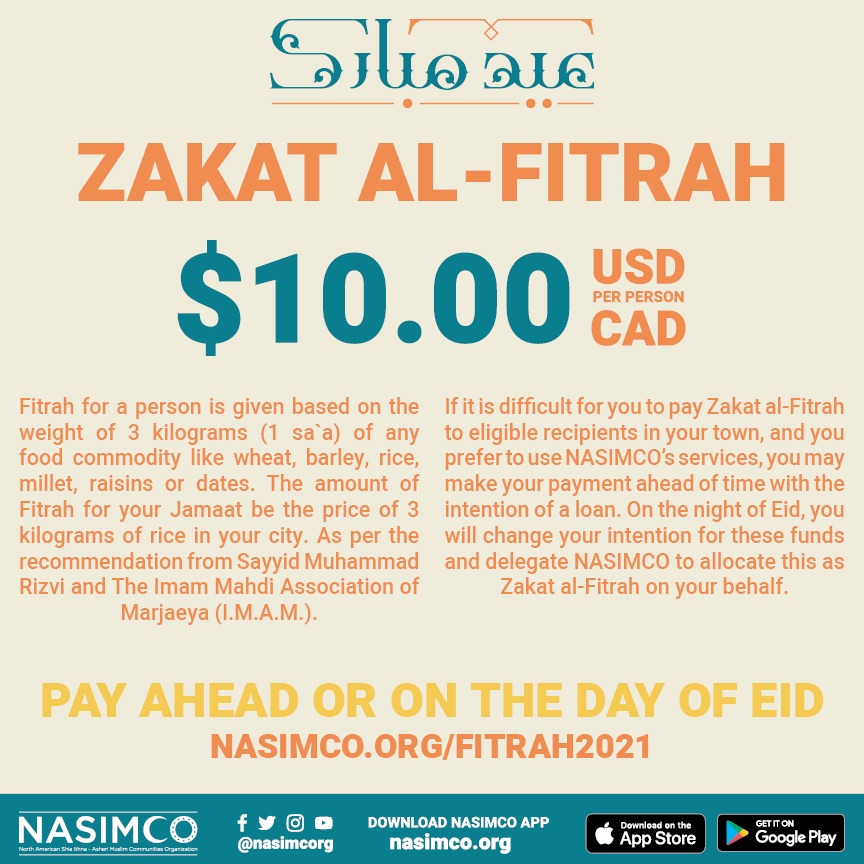
Pay ahead or on the day off
More information on Zakaat Al-Fitrah
“We fasted by Thy command in its daylight,
We stood in prayer with Thy help in its night,
Presenting ourselves by its fasting and its standing to the mercy which Thou hast held up before us,
And we found through it the means to Thy reward…”
– (Sahifa Sajjadiya – Bidding Farewell to the Month of Ramadhan)
Fitrah for a person is given based on the weight of three kilograms (one sa`a) of any food commodity like wheat, barley, rice, millet, raisins or dates. Ayatullah Seestani is of the opinion that Fitrah should not be given of an item that is not a staple food in your town. We suggest that the amount of Fitrah for your Jamaat be the price of three kilograms of Basmati rice in your city. As per the recommendation from Sayyid Muhammad Rizvi and the office of The Imam Mahdi Association of Marjaeya (I.M.A.M.) the amount for this year is set at $10.00.
As we approach the end of the Holy Month of Ramadhan, we realize that there are special circumstances in the midst of this global pandemic. If it is difficult for you to pay Zakat al-Fitrah to eligible recipients in your town, and you prefer to use NASIMCO’s services, you may make your payment ahead of time with the intention of a loan. On the night of Eid, you will change your intention for these funds and delegate NASIMCO to allocate this as Zakat al-Fitrah on your behalf. NASIMCO will then disburse it according to the religious criteria. If, however, you know of needy people in your community, you should give Fitrah directly to them and not send the funds to NASIMCO.
Below, please find some FAQs on Fitrah for your reference.
Fitrah FAQs
The following information on Fitrah is according to Fatawa of Ayatullah Sayyid Ali al-Husayn Seestani. Zakat al-Fitrah is religious tax/alms (zakat) paid on the day when Muslims break the fasting period at the end of the month of Ramadhan.
- Payment of Fitrah becomes obligatory after sunset on the eve of Eid al-Fitr. The Fitrah should be kept aside and paid on Eid al-Fitr before Eid prayers or before midday for those who cannot say their Eid prayers. It is necessary to have obligatory intention (niyyah) of giving Fitrah for God’s pleasure only.
- Giving Fitrah before the eve of Eid al-Fitr is not permissible. However, if you wish to send Fitrah earlier so that it reaches the needy on time, then you can send it as a temporary loan to the needy and then change your intention from loan to Fitrah on the eve of Eid al-Fitr.
- Paying Fitrah is obligatory on every Muslim who is mature (baligh), sane, financially able, and conscious on the eve of Eid al-Fitr. Fitrah should also be paid on behalf of all dependents (e.g. wife, children) whom one supports financially.
- Fitrah for a person is given on a weight of three kilograms (one sa`a) on any food commodity like wheat, barley, rice, millet, raisins or dates. Ayatullah Seestani is of the opinion that the item that is not a staple food in your town should not be given in Fitrah. Say, for example, if millet is not a staple in Vancouver then Vancouver mumineen should not pay Fitrah on millet.
- Cash value in lieu of any foodstuff mentioned can be given as Fitrah. To give an example, if a kilo of rice costs $3.33, the cash value of Fitrah on rice per person would be $ 10.00.
- Fitrah is given to the needy who are unable to meet their own or their dependants annual living expenses, nor do they have the means to do so through earning. Ayatullah As-Seestani says that the needy who is given the fitrah must be a Shi`ah Ithna `Ashari.
- Fitrah cannot be given to the needy who consumes alcohol, does not say his daily prayers (salat), commits sins openly, or he who is known to use the Fitrah in sinful way.
Following are some important rules:
- Fitrah should not be sent outside the town one resides in, if there are deserving mumineen in that town.
- Fitrah from a non-Sayyid cannot be given to a needy Sayyid; the reverse is permissible.
- A needy should be given at least one Fitrah
- Amongst the needy, relatives should be preferred over others when giving Fitrah, next in line are neighbors and then the learned.